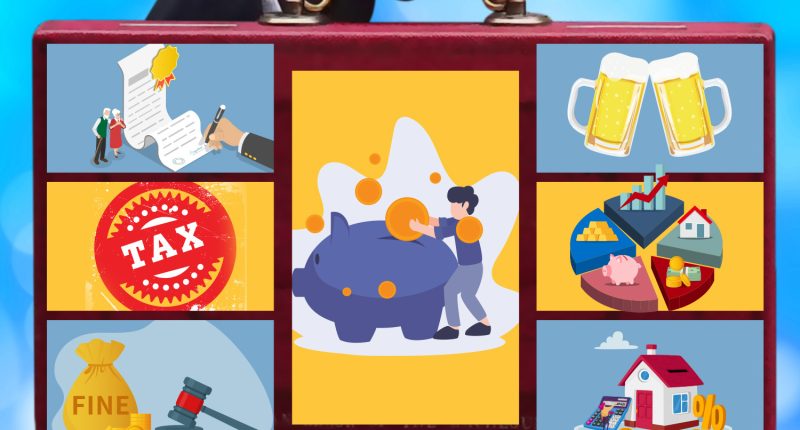THE Chancellor will reveal the government’s Spring Budget this week.
Jeremy Hunt is set to outline the financial plan for the rest of the year, including changes like tax hikes, cuts and benefits increases.
With many households still struggling to keep up with the cost of living, they’ll be keen for more information on any support packages or help available.
And with Britain’s economy slipping into a recession at the end of 2023, many will be eager to see what changes will be made.
But the Prime Minister has said the UK economy is getting “on the right track” during a visit to the site of the former Honda car factory.
Rishi Sunak said: “I think that’s a huge vote of confidence in the UK, and it shows that the work we’re doing to get the economy on the right track is paying off.”
Read more in Money
Meanwhile, Jeremy Hunt has said he hopes to use the Budget to “show a path” in the direction of tax cuts, but stressed any reductions in taxation would have to be “prudent”.
The Chancellor told the BBC’s Sunday with Laura Kuenssberg programme: “I do want, where it is possible to do so responsibly, to move towards a lower tax economy, and I hope to show a path in that direction.”
Of course, we won’t know exactly what’s coming in the Spring Budget until the day itself, but below we’ve had a look at what you could expect.
From potential tax cuts to changes to child benefit, here’s what could be announced on March 6.
Most read in Money
Universal Credit budget advance
What is it?
The Universal Credit budgeting advance is an
interest-free loan that can be used to cover certain expenses like household furniture and equipment, and clothing.
Of course, it is a loan, which means you have to pay it back.
Who’s eligible for the Universal Credit budgeting advance?
To get a budgeting advance, you must have:
- Received Universal Credit, Employment and Support Allowance, Income Support, Jobseeker’s Allowance or State Pension Credit for six months or more, unless you need the money to help you start a new job or keep an existing job
- Earned less than £2,600 (£3,600 jointly for couples) in the past six months
- Paid off any previous budgeting advances
The amount you can get depends on whether you can pay it back and whether you have any savings over £1,000.
Your first £1,000 of savings will be ignored, but the loan amount you are offered will be reduced by £1 for every £1 you have over that.
You can apply for a budgeting advance to cover things like:
- A one-off item – for example, replacing a broken fridge
- Work-related expenses – for example, buying uniforms or tools
- Unexpected expenses
- Repairs to your home
- Travel expenses
- Maternity expenses
- Funeral expenses
- Moving costs or rent deposit
- Essential items, like clothes
What’s expected?
The Chancellor is expected to announce that he is doubling the repayment period for these loans, from 12 months to 24 months.
A Treasury source said: “These changes will help make loans more manageable for those on Universal Credit.
“Through spreading repayments over a longer time period, we are taking action that is both fair to taxpayers and to claimants.”
Inheritance tax
What is it?
Inheritance tax is paid on the value of someone’s estate after a person passes away.
The estate includes things like property, money and possessions.
Any inheritance tax due is calculated on the value of the estate on the date of someone’s death and is paid within six months.
There’s normally no inheritance tax to pay if the value of your estate is below the £325,000 threshold.
You can also avoid paying the tax if you leave everything above the threshold to your spouse, civil partner, a charity or a community amateur sports club.
If your estate’s value is below the £325,000 limit, you will still need to report it to HMRC.
If you give away your home to your children – including adopted, foster or stepchildren – or grandchildren when you die, your inheritance tax threshold can increase to £500,000. This is called the “main residence” band.
The standard Inheritance Tax rate is 40% – but it is only charged on the part of your estate that’s above the threshold.
What’s expected?
The Chancellor is expected to have parked a potential cut to inheritance tax.
But it could still appear in the autumn statement instead, to time well with a late General Election.
A move to reduce inheritance tax had been on the cards after rumours circulated that changes were coming in last year’s Autumn Statement.
Sian Steele, head of tax at professional services and wealth management group Evelyn Partners, said: “There was much speculation before the Autumn Statement that the 40% rate would be halved, and this speculation has reappeared.
“But families with more modest estates that are being drawn into the Inheritance Tax net would probably rather see the nil-rate band raised.
“The £325,000 allowance has been frozen since April 2009 and would now stand at nearly £500k had it risen with inflation.”
Stamp duty cut
What is it?
Stamp duty is the tax you pay when buying a home.
A cut to the housing tax was initially announced in the mini-budget in September 2022.
Before the cut, no Stamp Duty was paid on the first £125,000 of any property purchase.
That’s now double at £250,000 for all home purchases.
The threshold at which the duty was paid for first-time buyers was £300,000. But that is now £425,000.
The maximum value of a property on which first-time buyers’ relief can be claimed also increased from £500,000 and is now £625,000.
It was later announced that the cut will remain in place until March 31, 2025.
What’s expected?
The government has been under pressure to make these changes to stamp duty permanent.
Most recent forecasts suggest The Chancellor has decided to shelve plans to cut stamp duty.
The measure will instead be considered for the autumn statement later in November or the Tory Party’s election manifesto.
Sian said: “A flagging housing market and a sluggish electorate could well prompt the Chancellor to look at extending stamp duty reliefs at the Budget.
“At a minimum, that’s likely to mean making the current extensions permanent – but could also take the form of further extensions to reliefs or a reduction in the rates of Stamp Duty.”
Some experts have even gone as far as to call for urgent reform or even the abolition of Stamp Duty.
Paul Johnson from the Institute for Fiscal Studies described it as one of our “worst and most damaging taxes“.
LISA changes
What is it?
Lifetime ISAs are often used by first-time buyers to get on the property ladder.
But the home must cost less than £450,000 – a threshold that has remained the same since 2017 despite rising house prices.
If savers use the money to buy a property that is over the scheme’s £450,000 limit they face a 6.25% withdrawal penalty.
This means that someone who has saved £20,000 could face only getting back £18,750 of their money if they choose to take it out.
What’s expected?
Jeremy Hunt is reportedly mulling the idea of cutting the Lifetime ISA (LISA) penalty rate and lifting the property limit.
Consumer champion Martin Lewis has hailed the expected announcement a major “win” for those looking to get on to the property ladder.
With house prices rising rapidly in recent years, many with LISA’s have found they’ve breached the £450k limit, leaving them stuck.
However, the penalty rate could be slashed from 25% to 20% and lift the property limit to £500,000.
It means those who bought a house worth £500k or more would still have to pay a penalty, but it would be 5% less than currently.
For example, someone with £20,000 saved, and a £5,000 bonus, would pay a penalty of £5,000 rather than £6,250, meaning they would break even.
Money-saving expert Martin Lewis, who has already called on the Government to address the issue, branded the prediction a “win” for first-time buyers.
Personal Savings Allowance
What is it?
The personal savings allowance lets you earn a chunk of interest before paying tax.
Basic rate taxpayers get £1,000 and higher rate taxpayers get £500.
Interest rates have been at rock bottom in recent years, meaning you’d have to have an awful lot of money stashed away to max out this allowance.
But interest rates are much higher now and currently stand at 5.25%.
A rate rise is generally good news for savers, as some banks have been bumping up interest rates on savings accounts.
But it means that savers are more likely to have to pay more tax because they’ll breach the personal savings allowance.
The tax on your savings will depend on how much interest you make, but also on your overall tax position.
What’s expected?
HMRC expects about 2.73million people to pay tax on their savings interest in the current tax year, including 1.37million basic rate taxpayers.
Basic rate taxpayers with a £1,000 allowance for savings interest could breach the at an interest rate of 5% with savings of more than £20,000 held outside an ISA.
“Despite the rapidly spreading impact of the frozen personal savings allowance on the UK’s savers, it has not yet featured in Budget speculation,” said tax expert Sian.
“But it is a source of growing frustration for many savers.”
Personal tax cuts
What are they?
Income tax is a tax you pay on your income, but only once you’re earning over a certain amount.
Anything earned in a year up to £12,570 is known as your personal allowance and you’re not taxed on that.
Beyond that, you are taxed a certain percentage depending on the amount you’ve earned.
If you earn £12,570 or less, you currently pay no income tax.
On earnings between £12,570 and up to £50,270, you pay the basic income tax rate of 20%.
Wages of £50,271 and above are taxed at the higher rate of 40%.
The additional rate of income tax, which applies to earnings of £125,140 or more, is 45%.
The thresholds for income tax generally rise each year so that people can earn more without paying more tax.
However, they’re currently frozen until 2028, which could drag millions into higher tax brackets.
National Insurance is a tax on your earnings, which is put into a fund to use for some state benefits.
This includes the state pension, statutory sick pay, maternity leave and unemployment benefits.
You pay National Insurance if you’re 16 or over and either:
- An employee earning above £242 a week
- Self-employed and making a profit of £6,725 or more a year
It is deducted from your wages each month.
There are different types of National Insurance – known as “classes” -, and the type you pay depends on your employment status and how much you earn, and whether you have any gaps in your National Insurance record.
What’s expected?
The Chancellor is being urged to press ahead with sizable giveaways in the Budget in a bid to get Britain growing.
This could come as a cut to national insurance or income tax.
Ex-Business Secretary Jacob Rees-Mogg said: “The economy clearly needs a boost and this should come in the form of lower interest rates and tax cuts.”
The Chancellor is said to be eyeing up a 1% reduction in national insurance – but could go further depending on an assessment of the economy by the government’s economic watchdog.
The Office for Budget Responsibility presented its findings to Mr Hunt on Friday, ahead of the main event on March 6.
The Chancellor said he would he will only cut taxes in a “responsible” way.
Sian said: “It is possible that, if there is going to be a big tax reveal, the Chancellor will make a direct appeal to voters by raising the higher-rate threshold.
“Not least because this could be presented as correcting the aberration of a threshold that has been kept artificially low, rather than an arbitrary giveaway.”
Beer duty cut
What is it?
Alcohol duty is a tax charged at the point of production or importation of drinks of alcoholic strength exceeding 1.2% alcohol by volume.
Duty rates differ for beers, ciders and perries, wines, spirits, and other fermented products.
The government has said it will freeze alcohol duties until August 1, 2024.
It was a major win for The Sun’s Save Our Sups campaign.
The freeze will come to an end at the beginning of August though.
What’s expected?
Beer bosses representing Britain’s most beloved brands have pleaded with Jeremy Hunt to slash alcohol duty by 5%.
Bar and brewery chiefs say the Chancellor could unlock 13,000 jobs with a five per cent cut.
He could also prevent a repeat of 2023 when more than 600 pubs tragically closed down due to soaring bills, red tape and levies.
Our campaign also calls for Mr Hunt not to hike alcohol duty so the hard-pressed sector need not raise booze prices in August.
In their letter, beer bosses said: “No government should turn a blind eye to the erosion of such an integral economic and cultural asset.
“The Spring Budget could help ensure that the Great British beer and pub sector can help contribute to wider growth and prosperity for the local high street and the wider national economy.”
Household Support Fund extension
What is it?
The Household Support Fund was first launched in October 2021 to help Brits pay their way through winter amid the cost of living crisis.
Councils up and down the country got a slice of the £842million funding available to dish out to Brits in need.
It has been extended four times since, but it is set to come to an end on March 31.
The help you can get varies depending on the council, as well as the applicant’s personal circumstances.
What’s expected?
Councils are urging the Government to extend the scheme essential to help protect vulnerable households.
Cllr Pete Marland, Chair of the Local Government Association’s Economy and Resources Board, said: “The Household Support Fund has provided an essential lifeline for our most vulnerable residents, but our survey shows this help is needed now more than ever.
“Now is not the time to scale back support.
“Many at-risk households continue to face considerable challenges in meeting essential living costs, with demand for support greater than when the fund was first introduced.”
Hard-up households may also be wondering if any more cost of living payments are in the pipeline.
There has been no word on whether more cash support is on the way yet.
However, if more support is in the pipeline, we’d be surprised if it isn’t covered in the Chancellor’s Statement.
High-Income Child Benefit charge
What is it?
If either parent or carer starts earning over £50,000, they have to start paying the high-income child benefit charge.
This means you have to pay back 1% of your child benefit for every £100 of income earned over the £50,000 threshold.
Once you reach £60,000 of yearly income you have to repay the full amount of child benefit received.
Parents have been caught out by the complicated rules and extra charge and landed with bills for thousands of pounds.
It’s up to parents to notify HMRC if they are liable for the charge and they must file a self-assessment tax return to pay it.
What’s expected?
Jeremy Hunt is said to have shelved plans to address child benefit changes in next week’s announcements.
The high-income child benefit thresholds could still be changed during the autumn statement later this year though.
Martin Lewis has said that the charge “unfairly penalises single-income families”.
This is because you start to lose child benefit when one earner hits £50,000 and you lose it totally when one earner hits £60,000.
But you can have two parents earning £49,000 that won’t lose it.
In a letter to the Chancellor, he said if the issue was addressed in the budget, he thinks it would be a “very popular measure”.
During an appearance on Good Morning Britain, Martin said The Chancellor could look at moving the thresholds to reduce the number of people impacted by the charge.
He said: “What he could do that would take many people out of it is simply increase the starting threshold and move it from £50,000 to £60,000.
“While that would not fix the unfairness, it would reduce the number of people caught by the unfairness.”
99% mortgages
What is it?
A 99% mortgage is a loan that covers most of cost of the property you’re buying.
With the average UK house price standing at £290,000, this could mean wannabe buyers getting on the ladder with a 1% deposit of just £2,900.
Most lenders usually require at least a 10% deposit, which would be £29,000 based on the average UK house price.
The scheme would allow first-time buyers to guarantee a mortgage with just a tiny deposit.
What’s expected?
A new 1% deposit scheme had been touted ahead of the Spring Budget.
Government sources said a Treasury-backed scheme could help generation rent, The Sun understands.
Ben Thompson, deputy chief executive at the Mortgage Advice Bureau said: “99% mortgages could help the thousands of people dreaming of becoming homeowners – particularly renters, who have seen rents rise and the dream of homeownership constantly moving away from them as they scramble to save large enough deposits.
“Although many things will need also to be addressed now, such as the level of housing supply and planning, for example, 99% mortgages could be the initiative desperately needed to help many people climb that first rung of the ladder.
“The devil, as always, will be in the detail when it comes to the 99% mortgage.
“Nevertheless, it could be an exciting move that would fulfil many aspiring homeowners’ dreams, and executed in the right overall way should be applauded and welcomed.”
The government already runs a mortgage guarantee scheme for first-time buyers with a 5% deposit.
Through the scheme, buyers can get a 95% loan-to-value (LTV) mortgage.
The scheme was extended in the Autumn Statement for a further two years until 2025.
It’s not yet clear if a new scheme would replace this.
The latest reports suggest that the Chancellor has now scrapped plans for such a scheme though.
Fuel duty
What is it?
Fuel duty is a hot topic for drivers as they look to keep the costs of buying petrol and diesel down.
It is a tax on fuel including petrol, diesel, biodiesel and bioethanol.
VAT (Value Added Tax) is also charged on most fuel.
The Sun’s Keep it Down campaign has forced ministers to freeze duties for 13 years in a row.
Thanks to The Sun’s crusade, fuel duty had been frozen at 57.95p since March 2011 and temporarily slashed by an extra 5p in 2022.
The 52.95p rate is due to expire in March.
What’s expected?
In a major win for The Sun’s Keep It Down campaign, fuel duty is expected to stay frozen for a 14th year.
Around 40 MPs and peers have written to Jeremy Hunt urging him to freeze rates and keep the 5p cut at next week’s Budget.
In their letter, they warn: “It would be catastrophic for British motorists if fuel duty rises in line with inflation.”
Raising duty would also deal a blow to businesses, hitting PM Rishi Sunak’s growth plans.
Keeping fuel duty frozen and extending the 5p cut — due to expire on March 23 — is expected to cost £5billion.
Tobacco duty
What is it?
Tobacco duty is a tax charged to companies making or importing cigarettes in the UK.
When the tax is raised, the cost is passed on to consumers who have to pay more for tobacco products in the shops.
The price of a pack of cigarettes last rose by £1.08 on average after a hike was confirmed in the government’s Autumn Statement in November.
A hike wasn’t expected as it is usually changed in the Spring Budget.
The price of cigarettes usually increases with inflation each year unless the Chancellor intervenes to freeze the rates.
The previous increase was revealed in the 2023 Budget, which saw the price of a pack of cigs increase by over 12%.
What’s expected?
The cost of a packet of cigarettes could top £16 at next week’s Budget.
The Treasury is said to be eyeing a dramatic increase in tobacco duty to ensure a tax on vapes keeps smoking alternatives cheaper.
The average cost of a 20-pack of cigarettes is currently £14.39 – making Britain one of the most expensive places to smoke in Europe.
In France, cigs cost about £9 per pack compared to £7 in the Netherlands and £6.50 in Germany.
Next week’s Budget is set to see a new vape tax imposed on imported e-cigs and manufacturers to make them unaffordable for kids.
The duty will apply to the liquid in vapes, with higher levels for products with more nicotine.
Non-dom tax
What is it?
“Non-dom” is short for “non-domiciled individual”.
It’s a term used for a UK resident whose permanent home, or domicile, is outside the UK.
Non-domiciled people, often referred to as non-doms, only pay UK tax on money earned in the UK.
They do not have to pay any tax to the UK on money made elsewhere.
For the well-off, it’s appealing because it offers the opportunity for huge and completely legal savings.
What’s expected?
The Chancellor is considering scrapping or scaling back “non-dom” tax rules.
The move could then raise billions of pounds to fund the potential cuts to National Insurance.
According to research by Warwick University and the London School of Economics, srapping the non-dom regime could generate £3.6billion for the government.
The most up-to-date statistics from HMRC show there were 68,800 non-doms in the UK for the tax year ending 2022.
Passenger Duty
What is it?
Air passenger duty (APD) is a duty chargeable per passenger flying from UK airports to domestic and international destinations.
APD follows a band structure, where duty rates vary by destination and by class of travel.
For example, the duty on flights travelling to a destination up to 2,000 away in standard class is £13.
It doesn’t apply to flights back to the UK, or on kids under the age of 16.
What’s expected?
Jeremy Hunt is considering a rise in business class air fares, according to The Telegraph.
It is understood that the move would raise hundreds of millions of pounds and help to fund any potential tax cuts.
For a flight of up to 2,000 miles in business class, the ADP rate currently stands at £26.
READ MORE SUN STORIES
This goes up to £191 for journeys up to 5,500 miles and £200 for trips over that threshold.
Do you have a money problem that needs sorting? Get in touch by emailing [email protected].
Plus, you can join our Sun Money Chats and Tips Facebook group to share your tips and stories.










